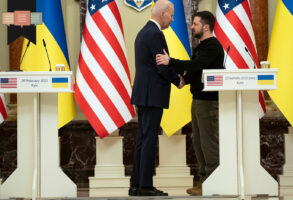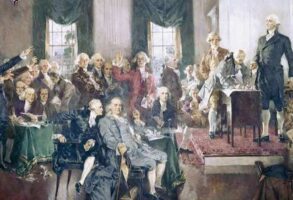
Published March 21, 2022
Over the past two years, we’ve seen fear dominate our political discourse. In the face of a once-in-a-century pandemic, many reacted with understandable fear, demanding governments take action to protect them and their loved ones. Others responded with fear—again understandable—that government overreach would destroy their way of life. During the ugliest election of our lifetimes, partisans on both sides mobilized voters with shrill warnings about what might happen if the other side won.
Of course, this is nothing new. In every era, fear has been the oil that keeps the engine of politics running. And yet, throughout Scripture our Lord calls us away from fearing political leaders and instead encourages us to engage politically with calm confidence.
Freedom over Fear
In 1 Samuel 8, the Israelites clamor for a king. Why? They were tired of living in fear of their Philistine neighbors; they wanted a ruler to protect them (1 Sam. 8:20). Their demand appears right after a narrative describing how the Lord—who needed no army and no weapon bigger than a wooden box—caused the whole Philistine nation to quake in their boots. Throughout the books that follow, God blesses some of the kings of Israel and Judah, but only when they refuse to give in to fear and learn rather to “stand firm . . . and see the salvation of the LORD on your behalf” (2 Chron. 20:17).
Throughout the Old Testament, God instructs his people that the only fear worth having is “fear of the LORD;” those dominated by fear of man will mistakenly put their trust in men to save them from fear, and they will be sorely disappointed.
The New Testament drives home the same theme. Every fear ultimately gains its strength from our mortality, from the fear of death, which undermines the security of every earthly good. It’s through this fear that sin holds us in bondage, and from this fear that Christ came to set us free (Heb. 2:14–15).
Free from the fear of death and devil, Christ models for his followers a startlingly carefree attitude toward this world’s politics. The Jews of his time—like the subjects of oppressive rule in many eras—lived in constant fear and hatred of the tax collector, and they fiercely debated whether they ought to pay his unjust demand. When Jesus was asked about the subject, he announced that sons of the kingdom are “free” from this duty, but then he tells his followers to pay taxes anyway—and just to prove they can always trust God to provide, he pulls the coin from a fish’s mouth (Matt. 17:25–27)!
Free from the fear of death and devil, Christ models for his followers a startlingly carefree attitude toward this world’s politics.
In Romans 13, Paul observes that political authorities are indeed a “terror”—but only to evildoers (v. 3). If Christians don’t want to live in fear of them, then the answer is simple: don’t do evil. But what if unjust rulers reward the evil and punish the good? Peter is ready with an answer: “But even if you should suffer for righteousness’ sake, you will be blessed. Have no fear of them, nor be troubled” (1 Pet. 3:14). The message of Scripture seems clear and maddeningly simple: those who trust in Christ and hope in the power of his resurrection have nothing to fear from “tribulation, . . . or danger, or sword” (Rom. 8:35); we need not cower in terror from political leaders nor cling in safety to them.
Perfect Love and Calm Confidence
Christians should not ignore politics—God has established the government for their good and for the good of their community—but the curious calm that characterizes our political engagement should constantly puzzle and confound our unbelieving neighbors. Each election cycle, all of us should expect incredulous friends to ask us, “Don’t you even care?”
Those who trust in Christ and hope in the power of his resurrection have . . . no reason to cower in terror from political leaders or cling in safety to them.
Of course, this is likely to smack of otherworldly idealism, a kind of disengagement from our world and nation that’s at odds with the service God has called us to. After all, isn’t fear the flip side of love? No one will reproach me for reacting in fear if my daughter is in the path of a speeding car; I fear because I love her. If I love my nation, will I not rightly fear if I see it going down the tubes? Should I not fear the harm done by bad policies? This is a very sensible objection, and yet John answers it categorically: “There is no fear in love, but perfect love casts out fear” (1 John 4:18). How could this be?
The answer is not an easy one, but I suspect it goes something like this. Through his providential rule, God ensures us that evil is always fighting a losing battle as Christ’s kingdom continues its inexorable advance. Thus, the Christian who loves his nation will not, finally, fear for his nation—not, at any rate, in his reflective moments. But rather, he’ll trust in God’s prevailing providence.
And yet confident love is not a call to political quietism; quite the contrary! If anything, it’s often the person possessed of perfect love and calm confidence who’s able to accomplish the most good in politics.
Consider the career of William Wilberforce, who labored for decades to destroy the monstrous evil of the slave trade. He possessed a firm assurance that the Lord’s cause would prevail in due course.
Or consider his friend, John Jay, who fought staunchly for American independence yet often bewildered his colleagues by his fearless equanimity. As he addressed his countrymen in 1776, “If we turn from our sins, he will turn from his anger. Then will our arms be crowned with success, and the pride and power of our enemies, like the arrogance and pride of Nebuchadnezzar, will vanish away. Let us do our duty and victory will be our reward.”
To be sure, not every story of Christian political engagement has a happy ending, a resolution that feels like “victory” in the near term. But the arc of history is long, and it ends in Christ’s triumph. Thus, as we labor today seeking justice for the oppressed and the good of our nation—whether the fight be for the alleviation of poverty or the lives of the unborn—we can do so freed from fear of man and death, in perfect love and full confidence that the battle belongs to the Lord. Let us indeed do our duty, and victory will be our reward.
Brad Littlejohn is president of Davenant Institute and is a fellow in the Ethics and Public Policy Center’s Evangelicals in Civic Life program where his work focuses on helping public leaders understand the intellectual and historical foundations of our current breakdown of public trust, social cohesion, and sound governance. You can follow him on Twitter.
Photo by Zach Camp on Unsplash
Brad Littlejohn, Ph.D., is a Fellow in EPPC’s Evangelicals in Civic Life Program, where his work focuses on helping public leaders understand the intellectual and historical foundations of our current breakdown of public trust, social cohesion, and sound governance. His research investigates shifting understandings of the nature of freedom and authority, and how a more full-orbed conception of freedom, rooted in the Christian tradition, can inform policy that respects both the dignity of the individual and the urgency of the common good. He also serves as President of the Davenant Institute.










